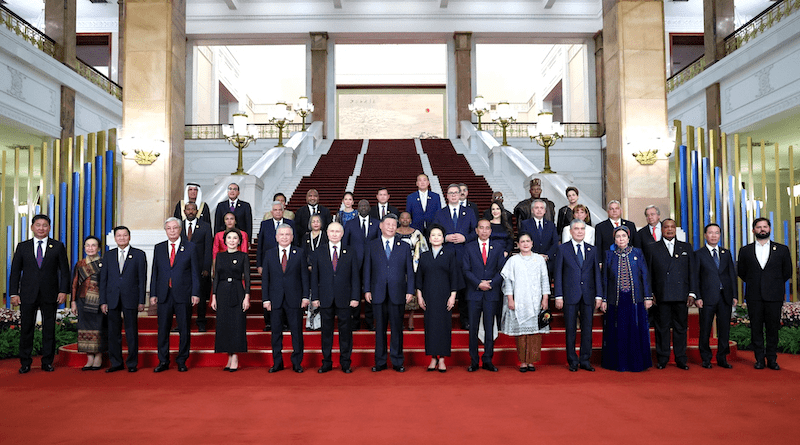China’s Belt And Road Forum Goes Smaller – OpEd
By Patial RC
‘Third Belt and Road Forum’ held in Beijing, China on October 18-19, was attended by top leaders from around the world under the slogan “Together for common development and prosperity.” The forum was organised to celebrate the 10th anniversary of Belt and Road Initiative (BRI), the brainchild of Chinese president Xi Jinping.
The main takeaway was that the top-level representation dropped to a new low, based largely on a lack of interest from European countries. In 2019, 37 top leaders attended. This year to celebrate the 10th anniversary only 23 heads of state or government representatives attended from more than 130 countries members.
The European interest has fallen especially after Beijing’s tacit support for Russia’s ongoing invasion of Ukraine and confirmation of President Putin’s attendance well in advance. Possibly others stayed away because of the ongoing current global crises in Ukraine-Gaza and pressing economic issues chose to stay away from the 10th anniversary celebration in Beijing.
Possible Reasons – Belt and Road Slow Down
- Majority BRI members now don’t see the Belt and Road Forum a big success story.
- When China launched its BRI initiative 10 years ago, it ventured into huge infrastructure linking it with Western Europe.
- Italy, the only Group of 7 nation to sign on to the scheme, is now looking for a way out.
- Trade war between the US-China and other trade sanctions.
- Russia’s invasion of Ukraine, and the Hamas-Israel war.
- Global Economic slowdown including in China and rising commodity prices.
- Member countries getting into ‘Debt Traps’,corruption and financial mismanagement. Sri Lanka, Pakistan, Laos, Kenya, Ghana, Zambia and many more are in debt traps and have to repay a huge amount to settle their debt.Sri Lanka’s Hambantota port and Pakistan’s Gwadar port are as good now being in Chinese control.
- Djibouti, where China has established its first overseas military base, is also not happy with the Chinese foothold on its soil.
US and Indian respective plans and joint plans to counter the BRI.India has tried to convince countries that the Chinese BRI is a plan to dominate Asia, warning that through geoeconomics BRI strategy China creates unsustainable debt burdens on small developing nations like Sri Lanka,Pakistan and few African countries. Accordingly, the US views India as a counterweight to a China-dominated Asia and has sought to knit together its strategic relationships in the region.
According to data from the American Enterprise Institute think tank more than $90 billion worth of Chinese commercial investment in BRI projects has faced “insurmountable problems.” The issues range from outright cancellation to indefinite delays, “mainly from political requirements and errors by Chinese firms”.
President Xi’s New BRI Strategy
President Xi is determined to carry forward his dream project and to make China a superpower by the middle of the 21st century to celebrate the 100th anniversary of communist China.President Xi is now pushing to go in for smaller projects and to move away from big projects like dams. The new strategy will focus on:
- ‘Small but Smart projects” along with signature projects.
- Efforts to move the initiative into a new phase of “high-quality development”.
- Promote sustainable “Green Development” in the next phase.
- Support advanced scientific and technological innovation through BRI initiative like high-tech ones such as digital finance and e-commerce platforms.
- Focusing on goodwill towards developing countries Beijing has finally agreed to restructure loans owed by Sri Lanka and Zambia.
Prior to the Russian invasion of Ukraine, the BRI appeared to have been more promising to Europe as the New Eurasian Land Bridge. With the ongoing Russian invasion of Ukraine for over 21 months and likely to enter 2024, China’s plans to expand trade and fortify transportation ties with Central and Eastern Europe have been unbalanced. China’s support for Russia during Putin’s trying invasion has near derailed may be temporarily the BRI dream project of President Xi Jinping in Europe. Added to the Russia-Ukraine conflict is the fresh Hamas-Israel war.
President Xi’s choice to stand by Putin has proved costly for the BRI till as long the war continues. The Russia-Ukraine conflict and the Hamas-Israel war has profoundly changed the geopolitical landscape and trend of the world groupings, with significant implications for China, both positive and negative.
The war in the Middle East hung over the meeting.Surprisingly,none of the national leaders who spoke at the opening ceremony raised the conflict.President Xi made his first public statement on the conflict since Hamas launched its October 7 attack in a meeting with Egypt’s representative to the forum, the Chinese leader called for a ceasefire and an end to the war “as soon as possible,” while backing a two-state solution that would establish an independent Palestinian state.
President Putin and Xi hailed the China-Russia partnership as “A Long Term Commitment,” stressing “Ever-Lasting Good Neighborliness and Mutually Beneficial Cooperation.” Both see the other as a critical partner in pushing back on what they perceive to be a US-led world order stacked against them.
Many of the recent events reflect that the uni-polar world order is indeed being replaced by a multi-polar one. Both the Russia-Ukraine conflict and the fresh Hamas-Israel war are further leading on to a bipolar and onto a multi-polar world. These two events are quickly impacting the contemporary international relations and power politics leading to groupings which will effect the new or ongoing BRI projects.
“There are two ways to conquer and enslave a country: One is by the sword; the other is by debt.” — John Adams

